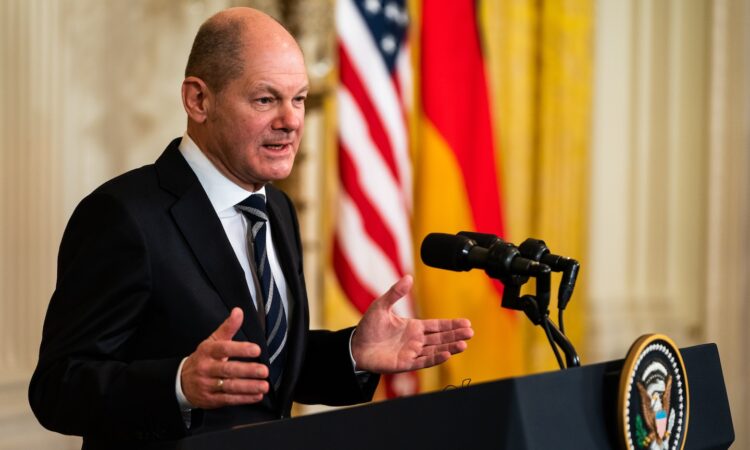
DB’s meltdown, after decades of underinvestment, is a symptom of broader problems sapping Germany’s faltering economic prospects, deepening its political dysfunction, subverting its confidence — and raising doubts about whether Europe’s biggest country can assert itself at a critical moment.
The stakes are mounting as dwindling Republican support for Ukraine looks increasingly likely to imperil U.S. arms and funding for Kyiv. If Washington turns its back, Europe will need to fill the leadership void. But what if Germany shrinks from the role?
Days after Russia’s full-scale invasion of Ukraine in February 2022, German Chancellor Olaf Scholz dramatically announced to his stunned countrymen that a historical turning point had arrived: The nation’s complacent assumptions, along with paltry defense spending, had to be ripped up and rewritten.
Fast forward 20 months and Scholz has made some headway. Just as clearly, it’s apparent where he’s falling short.
Berlin, with the West’s heftiest economy after the United States, stepped up to become Ukraine’s second-biggest arms supplier. In August, Germany announced plans for $5.3 billion in annual military aid to Ukraine until 2027, a substantial lifeline.
But Germany has also failed to lead at key moments, suggesting its fear of Moscow outweighs its determination to help Ukraine drive back Russian forces. Scholz has remained opposed to a path toward Ukrainian membership in NATO even as many European countries, including France, supported it.
Spurred by Russian President Vladimir Putin’s invasion, the chancellor last year announced a $105 billion special fund to modernize Germany’s anemic armed forces over the coming years. Yet little of that money has been spent so far, and Germany has no long-term plan to spend 2 percent of annual economic output on defense, NATO’s target minimum.
Meanwhile, Ukraine has run perilously low on ammunition.
Last winter Scholz dithered on giving top-of-the-line battle tanks to Kyiv until President Biden did so first. Now, in an apparent rerun, he is balking at sending German-made Taurus cruise missiles — even though the British and French have shipped their own versions — as the White House dawdles on equipping Ukraine with U.S.-made cruise missiles.
Germany has about 600 Taurus missiles. No single conventional weapon is a game changer but the Taurus would provide Ukrainian forces with potent firepower. Unlike the British and French missiles, which can punch holes in big targets, the Taurus’s warhead could collapse the Kerch Bridge linking Russia and Crimea, cherished by Putin as a symbol of Moscow’s annexation.
Germany’s economy, beset by inflation, labor shortages and sky-high energy prices, is expected to shrink in 2023, alone among the world’s biggest economies. Over the next five years, it is expected to grow more slowly than the economies of the United States and major European countries, including Britain, France and Spain. It has also been a digital laggard, with slow WiFi and spotty cellphone reception. Berlin taxis lack the gizmos that produce electronic receipts.
In polls, Germans are gloomy about the future. In no other major European country are people so worried about the inflow of immigrants, attracted by generous social benefits. Across the five states that once made up communist East Germany, anger over spiking illegal immigration and economic doldrums has fed a surge in support for a far-right ethno-nationalist party, Alternative for Germany, some of whose leaders have used Nazi-tinged rhetoric.
Most worrying, overall German support for helping Ukraine is shakier than in other major European countries. That suggests Scholz’s caution reflects popular opinion. But it also means the colorless chancellor, whose government is unpopular, has struggled to rally the German public to a cause he says is critical — the defense of a democratic nation against Putin’s neo-imperial fever dream.
“If you connect the dots, it all shows a country that’s not going through a good phase,” said Martin Quencez of the German Marshall Fund of the United States.
In peacetime, Americans could reasonably shrug at Germany’s struggles. They have no such luxury now.
Biden’s own promise to ensure Ukraine’s survival — “for as long as it takes” — looks shakier by the day as GOP support for Kyiv crumbles in the House. Europe lacks the military industrial might and array of advanced weaponry to plug the gap if U.S. support for Ukraine dries up. Yet a strong Europe — united, confident, economically vibrant — might conceivably provide the bare minimum Kyiv needs to stand fast.
That’s why Germany’s long slide is a red alert. Without robust German leadership, ideally in concert with the French, Europe is a wobbly construct. Add to that Washington’s distraction and dysfunction, and Ukraine’s prospects darken.
A remark often attributed to Henry A. Kissinger — “Who do I call if I want to speak to Europe?” — summoned the idea of an atomized and feckless continent. Germany’s current distress might justify that misgiving.






